#soviet invasion of germany
Text
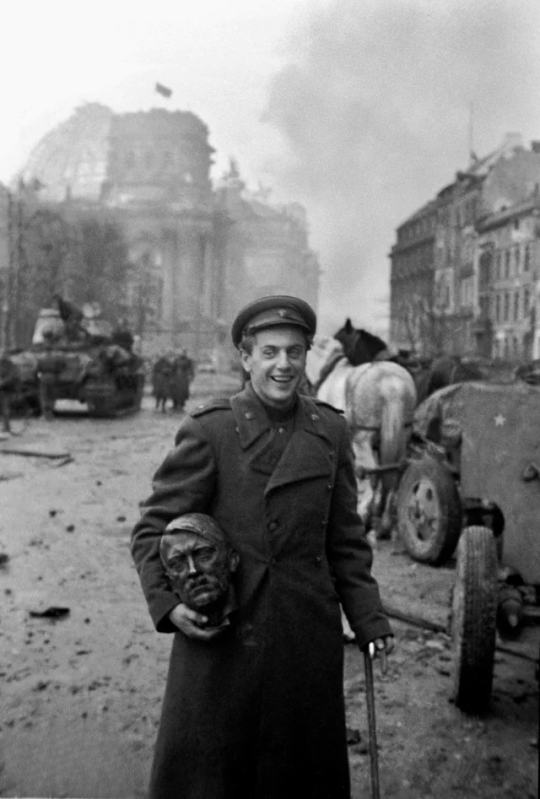
Poet Yevgeniy Dolmatovsky poses with a bronze bust of Adolf Hitler in Berlin, May 1945
204 notes
·
View notes
Video
youtube
"Warszawskie dzieci" or "Warsaw Children" is a song about the bravery of the young Polish children who faced the horrors of war. From August 1, 1944, these children, alongside the adult resistance fighters, fearlessly defended their beloved city during the Warsaw Uprising from Nazi invasion and occupation.
#youtube#europe#poland#history#ww2#wwii#stop germany#stop ussr#stop nazi gerrmany#war#conflict#stop invasion#stop war#stop soviets#stop nazis
3 notes
·
View notes
Photo

In the bad old days of communism, Checkpoint Charlie was a crossing point between West Berlin and Soviet occupied East Berlin. It was one of the few openings in the Berlin Wall. However East Germans were not allowed to use these portals because their Soviet puppet government feared losing its population to the West.
Nowadays at the site of the old checkpoint is a museum and some souvenir shops. For this holiday season there is also a Christmas tree decorated with Ukrainian flags. It acts as a reminder that the threat of Russian imperialism is not just something in the past.
Vladimir Putin was a lieutenant colonel in the Soviet secret police (the KGB). In the 1980s he was stationed in East Germany. So in addition to showing support for Ukraine, this pro-Ukraine Christmas tree could be seen as a dig at Putin.
The flag of Ukraine is distinctive and simple. If you wish to add one or more to your own holiday decorations, the color codes can be found here.
#berlin#christmas tree#checkpoint charlie#berlin wall#the cold war#east germany#flag of ukraine#weihnachtsbaum#berliner mauer#ddr#soviet union#ussr#kgb#vladimir putin#russia#invasion of ukraine#владимир путин#россия#ссср#вторгнення оркостану в україну#флаг#путин хуйло#руки прочь от украины!#україна переможе#слава україні!
2 notes
·
View notes
Photo

Russian T-55 tanks were ready to start invasion at Checkpoint Charlie, Berlin, Germany, October 27, 1961. Source: wikipedia
P.S. Only a determined show of force by NATO prevented a Russian invasion at the time
#Berlin#Germany#West Germany#russian invasion#russian threats#soviet occupation#Checkpoint Charlie#russian attack on europe#T-55#tank#Cold War#European history#military history#russian imperialism#enemy at the gates#West Berlin
3 notes
·
View notes
Photo
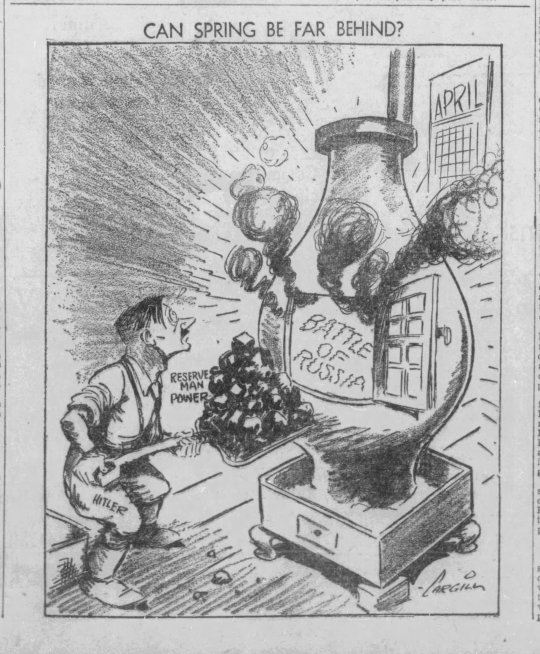
“Can Spring Be Far Behind,” Sault Star. April 16, 1942. Page 2.
----
Comic by Cargil. Hitler shovels coal marked Reserve Manpower into a glowing hot furnace marked Battle of Russia.
#political cartoons#satirical cartoon#editorial cartoons#world war II#eastern front#russian front#german invasion of the soviet union#nazi germany#a. hitler#mockery of the axis#axis vs allies
0 notes
Note
Do you have any good reads on the Molotov–Ribbentrop Pact? I don’t trust wikipedia on this because all sources are from anglo-american sources and one is from radio free europe lol
I'm bad at giving reading references, but in brief: the USSR first approached each of the western powers and attempted to form an anti-Nazi alliance, but none of them aggreed, because they wanted the Nazis to weaken or outright destroy the USSR, and kill two birds with one stone (hence the 'appeasement' period); all the other powers had their own treaties with Germany that were generally equivalent wrt non-aggression; and the USSR eventually formed its own non-aggression treaty with Germany *because* they and everyone else knew Germany was planning to invade and genocide the USSR, so they needed as much time as possible to prepare their defences (for their piece, the Nazis would expect increased war preparations on the part of the USSR to actually *benefit* their invasion, as they hoped that the USSR would dedicate all its forces to its western border, and have them decisively encircled and destroyed all at once with the initial, speedy push - the USSR showed great restraint and forced Germany instead to commit to a lengthy, protracted invasion to fight the bulk of the Soviet army in its own depth). The Soviet occupation of Poland, while having its obvious negative aspects, also prevented further Nazi advance, and prevented the Nazi occupation of half of Poland, during which time Polish jews were able to be evacuated - and lest we forget that Poland itself was an extremely reactionary, antisemitic state at the time already. The USSR only occupied Polish territory once it became clear that the Nazis would not stop at the part of Poland designated to be in 'their sphere', and would continue to occupy the part that was technically protected in the treaty by being designated as part of the 'Soviet sphere'. The idea of a 'Nazi-Soviet alliance' that carved up Poland is a key piece of ideological justification for the equivocation of fascism and communism, and, along with the 'double genocide' myth, was perpetrated directly by the Nazis themselves.
504 notes
·
View notes
Text
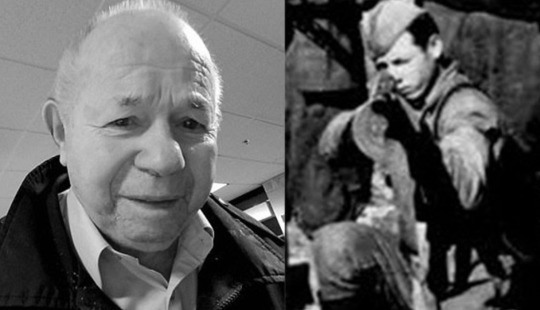
THURSDAY HERO: Benjamin Levin
Killing Nazis at age 14
Benjamin Levin was a young resistance fighter who, as one of the notorious “Avengers,” spent World War II hiding in a Lithuanian forest, emerging only to kill Nazis or bomb their supply chains.
Benjamin was born in Vilna in 1927. His father Chaim was a successful businessman and the family lived a comfortable life. In 1941, however, Chaim was tipped off that Nazi Germany was about to invade Lithuania. As Jews, that meant the Levins’ days were numbered. Chaim quickly sold his business at a loss, used the proceeds to buy weapons, and went into hiding with his family.
At the time, Benjamin was a 14 year old juvenile delinquent who’d started smoking at age 8 and was member of a street gang. After the German invasion, he chose not to stay with his parents in their hiding place, instead joining the fierce resistance group known as the “Avengers” led by Abba Kovner. Benjamin was an immediate asset to the group due to his unique combination of exceptional bravery and diminutive size. His baby face and unassuming appearance enabled him to avoid attracting attention, even in enemy territory.
Hidden in a Lithuanian forest, the teenager and his fellow Avengers killed Nazis, bombed their transportation lines, and smuggled life-saving food and medicine into the Jewish ghettoes. It was later estimated that the brave band of guerrilla fighters had killed 212 Nazis. Their policy was “take no prisoners.” In 1944, the Jewish fighters helped the Russian army liberate Vilna, after which they marched through town looking for Nazi collaborators to execute.
Benjamin’s parents survived the war in hiding, but when they returned to Vilna to reclaim their home, their former neighbors murdered them on the spot. With nothing to keep them in Europe, Benjamin and his sister moved to pre-state Israel, where he joined the Jewish militant group Irgun, fighting the British occupation of Palestine. Benjamin was in charge of helping Jewish survivors in Europe relocate to Israel. Benjamin’s street smarts and people skills served him well as he traveled through Turkey and Syria with European Holocaust survivors.
The Soviet army did not appreciate Benjamin’s work rescuing Jews from behind the Iron Curtain, and in 1947 he was arrested and sent to a Siberian gulag. After a year, Benjamin was released from the gulag and hitchhiked his way to Southern Europe, where he reconnected with the Irgun in Italy. The organization arranged for him to enroll in college and earn a degree in mechanical engineering. He was assigned to the engine room of a ship that sailed around the world, collecting money, weapons and volunteers to fight for the Jewish state.
The ship was called Altalena, and headed to Israel with hundreds of Holocaust survivors on board, as well as Jewish volunteers from around the world, and a cache of heavy ammunition secretly donated by France. When the Altalena reached Tel Aviv and tried to dock, the ship came under fire by the Haganah, a rival military group. Under machine-gun fire, young Benjamin leapt off the ship and swam to shore, then snuck into the country unnoticed. He had been through so much in the previous several years, had lived so many lives and assumed so many identities, that he actually forgot his own birthday. Later, he decided to make Passover – the festival of freedom – his official birthday.
Benjamin met his wife Sara, a Hungarian immigrant, in Israel, and ironically she was serving with the Haganah when they fired on the Altalena. Together they had two children, and moved to New York in 1967, where Benjamin worked as a mechanic and owned a gas station. In the 1990’s, Benjamin was interviewed extensively by Steven Spielberg as part of the Shoah Foundation oral history project.
For decades, Benjamin was an in-demand public speaker at New York high schools, where he spoke about the Holocaust and his remarkable life. Toward the end of his life, Benjamin was unable to speak, but he insisted on continuing his school appearances, with his son Chaim – named for Benjamin’s father – doing the speaking for him. Chaim remembered how much Benjamin loved interacting with students, and described his father as having “an enormous amount of energy and joy and love.”
Benjamin Levin died on April 13, 2020 at age 93. The last survivor of the Avengers, Benjamin died during Passover – his adopted birthday.
For heroically fighting Nazis and saving European Jews, and for educating generations of New York schoolchildren about the Holocaust, we honor Benjamin Levin as this week’s Thursday Hero.
152 notes
·
View notes
Text
Finished The Wages of Destruction.
Solid 9/10.
Core ideas to take away:
work creation was a minor element of Nazi economic policy, a distant secondary concern after rearmament
rearmament had widespread public support in germany
shifting to autarky took extremely hacky and likely long-run unsustainable export controls, and even *export subsidies* because imports were still an inescapably vital input to industrial production in
controlling big business was largely a "soft co-opting" project while the agriculturalists were insane morons who were much more staunchly pro-nazi
once at war, Germany was going for broke from the very beginning and there was near-zero slack they could've squeezed out more war production from
truly pitiful productivity rate from Germany's conquered continental empire - the workers were far far more productive if deported to Germany than working in home countries
German surface navy seems useless, they didn't even have the oil to run the ships, and metal would've been better used elsewhere
Speer was a shit, Tooze hates hates him
bombing campaign actually was successful! specifically taking out the Ruhr
"blitzkrieg" doctrine was developed as they went; original 1940 invasion of France battleplan was to go "right up the center" not through the Ardennes and pre-battle production focused on heavy artillery ammunition
Bigger points: German "Strategy"
Germany escalated from diplomatic crisis to war with Poland/UK/France, and to war with the Soviet Union, and then America, out of a series of perceived closing windows of opportunity. First one was seeing UK/French production overtaking them in rates and catching up on stocks. In 1940 the US fully commits to aiding Britain, creating sense of "the bombers are coming eventually" and need to gain immediate advantage by conquering the Soviet Union.
Bizarrely, German production was focused on the Luftwaffe in preparation for fighting US/UK air war as Germany was getting ready for Barbarossa!
Declaration of war on US pitched as confirming alliance with Japan, but still feels stupid. Germany could just stay quiet and force US to either engineer entry to European conflict another way or stay out. Still seems less stupid, considering this is at a time when Barbarossa is coming apart.
But overall, a sound if massively risky plan assuming you accept the insane basic assumptions. Hitler's strategic vision often gets assumed to be terrible out of disgust for the consequences of his actions and their failure.
I really do wonder what the vibe was among German economic elite from 1942 onwards, it's obvious the war is not winnable, that you're very fucked, and that everyone is coming to kill you.
Anyways, good book and worth reading/listening to. Tooze could've slimmed down on the pre-war stuff. I find him vaguely irritating with how he brings up irrelevant things just to show how smart he is but that's probably just envy.
P.S.
The original Volkswagen was just a massive scam with no actual civilian cars being produced despite taking all the payments for the vehicles. Possibly suggests two dominant strains of conservatism? Former is old aristocratic conservatism of the nobility or classic US elite; latter is the populist oppositional culture right-wingism which is about 64% scam artists.
69 notes
·
View notes
Text
Geopolitics is not what you think.
It is interesting to me that how we view issues of global politics and how academics and certain political actors view the issues have such a huge separation.
For instance, when people view the russian invasion of ukraine, they think of a simple power grab, or they don't understand why russia would want to do that.
When i was talking to a friend, who is a geopolitical expert, about the russian war against ukraine, he pulled out a topographical map of europe. Geopolitics is the study of how geography affects politics. it is NOT a general term for international politics.

The easy answer is Russia's need for a warm water port. If you know russia's borders, you would know that all of it's major ports are in the north and they freeze in the winter. They don't have a good port in the black sea that stays unfrozen. Sevastopol is the port in Crimea. While technically Ukrainian territory, it has been controlled by Russia since 2014.
The second point he made was looking at the moutains. See the map above. Then let's look at a map of the warsaw pact

Understanding moutain ranges and how they are defensible, you start to see why NATO and the Warsaw pact involved those specific countries. it creates a natural bottle neck in Germany. This also goes into why Poland gets invaded so much. it is a flat territory without natural boundaries that makes it easy to attack, and if you want your border to be a mountain you have to go through Poland. Without the countries to make up its borders anymore, Russia lacks natural boundaries. Instead of the carpathian mountains, they have simple grassland.
Then you talk to demographers as to why russia is aggressive, you see that since the end of the cold war, russia's death rate has exceeded it's birth rate. this causes a decline in population and a "demographic crisis." the average age in russia is over 40 years old. this stagnation has rippling effects throughout the country. with an older workforce, they don't have a surplus younger generation to pay for the care of the older generation. they are experiencing migration out of the country of individuals with experience and education needed in the country. They are, in short, a nation in panic.
In the international relations field, you see discussions of the lack of political influence. Russia once held a spot as one of two superpowers in the world. a regional giant who's influence shook the way international politics operated. From 1950-1989 there were really only two countries in the world that everyone needed to pay attention to: the Soviet Union and the United States. everyone else was a pawn. There was the First world, the US and her allies, the Second World, the Soviet Union and her allies, and the Third world, the non-aligned nations. (which, by the way, is where that phrase came from. a "third world" country was thought as a country so unimportant, neither the US or USSR cared about you.) in this climate, Russian, who still held what was considered the second most powerful military in the world (though... not so much now) felt they were under appreciated. China was the emerging economic powerhouse.
This is something i went into in my IR video. (as i have an IR background)
youtube
What is amazing about all this analysis is that different fields point to different reasons as to why russia invaded. and similar analysis could be done other regions. any conflict can be analyzed in this manner. the disputes in africa are interesting because the easy answer to why there are so many wars in africa is "colonialism." and i think it does make a useful, simplified solution. but it foregoes the other realms of analysis as to why these conflicts are happening.
not sure what made me procrastinate on making a video and writing this out. i needed a break from editing. I hope you found this interesting.
123 notes
·
View notes
Photo
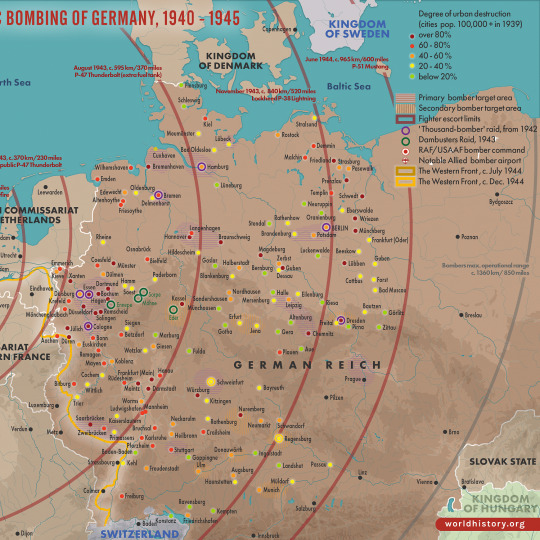
Allied Bombing of Germany
The Allied strategic bombing of Germany during World War II (1939-45) had multiple aims, which included destroying Germany's capacity to produce weapons; disrupting transport networks and supplies of oil, steel, and coal; destroying the German air force; and breaking civilian morale. To these ends, industrial cities, factories, railways, airfields, and dams were struck throughout the conflict.
Secondary goals of the strategic bombing campaign by the British Royal Air Force (RAF) and United States Army Air Force (USAAF) included boosting home morale that Germany was paying a price for its invasion of Europe and bombing of Britain. Another aim was to demonstrate to the USSR that the Western allies were assisting the Soviet campaign on the Eastern Front. Some Allied commanders believed that the war could be won using air power alone, avoiding a land invasion. As it turned out, despite the bombers causing tremendous physical damage and the deaths of hundreds of thousands of civilians, Germany fought on, and only a land operation from the east and west would finally win the war.
Why Did the Allies Bomb Germany?
The official military objectives of the strategic bombing of Germany are indicated in several directives formulated by the Allied Joint Chiefs of Staff. The Casablanca conference in January 1943 noted that the objective of the bombing offensive was:
The progressive destruction and dislocation of the German military, industrial and economic system, and the undermining of the morale of the German people to a point where their capacity for armed resistance is fatally weakened.
(Dear, 196)
The Casablanca objective was amended by the Pointblank Directive of June 1943. This emphasised the importance of destroying German fighter plane production in readiness for the D-Day Normandy landings (Operation Overlord) planned for the summer of 1944. Before the Allies could contemplate a land invasion of Continental Europe they had to achieve air superiority or their armada would be destroyed. The Quebec conference of August 1943 reaffirmed the objectives of Casablanca and Pointblank but removed the objective regarding civilian morale.
Other aims of the bombings, perhaps not officially expressed but there, nonetheless, were to show the British and American public and Russia that something was being done to take the war to Germany. In the absence of a land attack on Germany, bombing was the next best thing. As the German Armaments Minister Albert Speer (1905-1981) noted, the air war became "a second front", one that absorbed men and machines which otherwise could have been used on the Eastern Front against Russia and in coastal defences in northern France.
Continue reading...
26 notes
·
View notes
Text
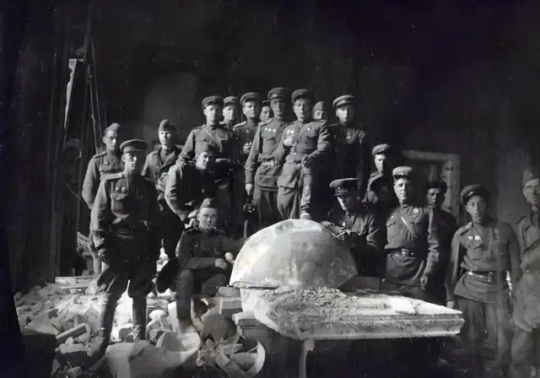
Soviet officers pose in the ruins of Hitler's office, Berlin. April 1945
87 notes
·
View notes
Note
Just so that everyone is on the same page: if we are going to analogize the Russian invasion of Ukraine to the American invasion of Iraq, Russia is playing the role of America.
Russia is even running the same bullshit "our enemies are fascist" propaganda campaign.
If you're anti war, you should be protesting Russian warmongering, not American aid to those resisting.
I’ve talked extensively about how Russia is doing the “war on terror” routine, and how the invasion, which I oppose, is causing Ukraine to become more fascist in reaction (banning of all opposition parties, welcoming of neonazi militias into the national guard, etc).
I’ve been analogizing to Afghanistan, not Iraq, which if you recall, was also invaded by Russia (then the Soviet Union) and the US trained and armed the mujahideen in response. Something I think we can agree was a bad move, given that the Taliban now controls the country, no?
I do not live in Russia, I can’t meaningfully protest their government, but I can protest mine sending over fucking cluster munitions man. Government officials in the US (and a number of European countries, Germany most recently) have outright said they don’t care if Ukrainians want to surrender, they will keep pushing for total victory. It’s a meat grinder that NATO is pouring Ukrainians into and reaping the benefits of. I want it to end.
74 notes
·
View notes
Photo
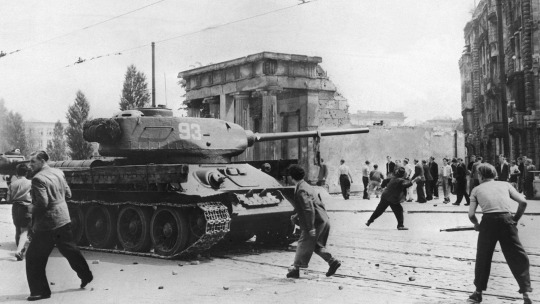
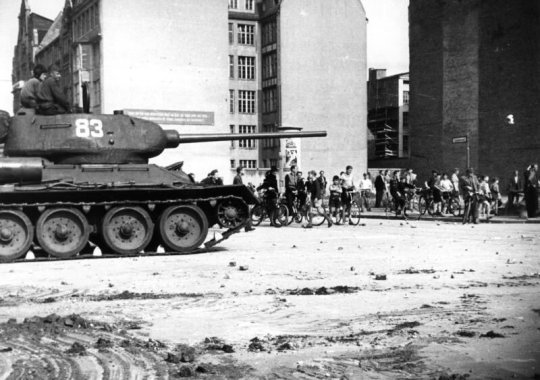
In June of 1953, the Russian tanks crushed workers protests in East Germany.
#Germany#russian invasion#mass repressions#T-34#tank#opressive regime#russian occupation#russian war crimes#war criminal#Berlin#East Germany#collapse of the soviet union#defense of liberty#uprising#Cold War#vintage photography
3 notes
·
View notes
Text
In February 1994, in the grand ballroom of the town hall in Hamburg, Germany, the president of Estonia gave a remarkable speech. Standing before an audience in evening dress, Lennart Meri praised the values of the democratic world that Estonia then aspired to join. “The freedom of every individual, the freedom of the economy and trade, as well as the freedom of the mind, of culture and science, are inseparably interconnected,” he told the burghers of Hamburg. “They form the prerequisite of a viable democracy.” His country, having regained its independence from the Soviet Union three years earlier, believed in these values: “The Estonian people never abandoned their faith in this freedom during the decades of totalitarian oppression.”
But Meri had also come to deliver a warning: Freedom in Estonia, and in Europe, could soon be under threat. Russian President Boris Yeltsin and the circles around him were returning to the language of imperialism, speaking of Russia as primus inter pares—the first among equals—in the former Soviet empire. In 1994, Moscow was already seething with the language of resentment, aggression, and imperial nostalgia; the Russian state was developing an illiberal vision of the world, and even then was preparing to enforce it. Meri called on the democratic world to push back: The West should “make it emphatically clear to the Russian leadership that another imperialist expansion will not stand a chance.”
At that, the deputy mayor of St. Petersburg, Vladimir Putin, got up and walked out of the hall.
Meri’s fears were at that time shared in all of the formerly captive nations of Central and Eastern Europe, and they were strong enough to persuade governments in Estonia, Poland, and elsewhere to campaign for admission to NATO. They succeeded because nobody in Washington, London, or Berlin believed that the new members mattered. The Soviet Union was gone, the deputy mayor of St. Petersburg was not an important person, and Estonia would never need to be defended. That was why neither Bill Clinton nor George W. Bush made much attempt to arm or reinforce the new NATO members. Only in 2014 did the Obama administration finally place a small number of American troops in the region, largely in an effort to reassure allies after the first Russian invasion of Ukraine.
Nobody else anywhere in the Western world felt any threat at all. For 30 years, Western oil and gas companies piled into Russia, partnering with Russian oligarchs who had openly stolen the assets they controlled. Western financial institutions did lucrative business in Russia too, setting up systems to allow those same Russian kleptocrats to export their stolen money and keep it parked, anonymously, in Western property and banks. We convinced ourselves that there was no harm in enriching dictators and their cronies. Trade, we imagined, would transform our trading partners. Wealth would bring liberalism. Capitalism would bring democracy—and democracy would bring peace.
After all, it had happened before. Following the cataclysm of 1939–45, Europeans had indeed collectively abandoned wars of imperial, territorial conquest. They stopped dreaming of eliminating one another. Instead, the continent that had been the source of the two worst wars the world had ever known created the European Union, an organization designed to find negotiated solutions to conflicts and promote cooperation, commerce, and trade. Because of Europe’s metamorphosis—and especially because of the extraordinary transformation of Germany from a Nazi dictatorship into the engine of the continent’s integration and prosperity—Europeans and Americans alike believed that they had created a set of rules that would preserve peace not only on their own continents, but eventually in the whole world.
This liberal world order relied on the mantra of “Never again.” Never again would there be genocide. Never again would large nations erase smaller nations from the map. Never again would we be taken in by dictators who used the language of mass murder. At least in Europe, we would know how to react when we heard it.
But while we were happily living under the illusion that “Never again” meant something real, the leaders of Russia, owners of the world’s largest nuclear arsenal, were reconstructing an army and a propaganda machine designed to facilitate mass murder, as well as a mafia state controlled by a tiny number of men and bearing no resemblance to Western capitalism. For a long time—too long—the custodians of the liberal world order refused to understand these changes. They looked away when Russia “pacified” Chechnya by murdering tens of thousands of people. When Russia bombed schools and hospitals in Syria, Western leaders decided that that wasn’t their problem. When Russia invaded Ukraine the first time, they found reasons not to worry. Surely Putin would be satisfied by the annexation of Crimea. When Russia invaded Ukraine the second time, occupying part of the Donbas, they were sure he would be sensible enough to stop.
Even when the Russians, having grown rich on the kleptocracy we facilitated, bought Western politicians, funded far-right extremist movements, and ran disinformation campaigns during American and European democratic elections, the leaders of America and Europe still refused to take them seriously. It was just some posts on Facebook; so what? We didn’t believe that we were at war with Russia. We believed, instead, that we were safe and free, protected by treaties, by border guarantees, and by the norms and rules of the liberal world order.
With the third, more brutal invasion of Ukraine, the vacuity of those beliefs was revealed. The Russian president openly denied the existence of a legitimate Ukrainian state: “Russians and Ukrainians,” he said, “were one people—a single whole.” His army targeted civilians, hospitals, and schools. His policies aimed to create refugees so as to destabilize Western Europe. “Never again” was exposed as an empty slogan while a genocidal plan took shape in front of our eyes, right along the European Union’s eastern border. Other autocracies watched to see what we would do about it, for Russia is not the only nation in the world that covets its neighbors’ territory, that seeks to destroy entire populations, that has no qualms about the use of mass violence. North Korea can attack South Korea at any time, and has nuclear weapons that can hit Japan. China seeks to eliminate the Uyghurs as a distinct ethnic group, and has imperial designs on Taiwan.
We can’t turn the clock back to 1994, to see what would have happened had we heeded Lennart Meri’s warning. But we can face the future with honesty. We can name the challenges and prepare to meet them.
There is no natural liberal world order, and there are no rules without someone to enforce them. Unless democracies defend themselves together, the forces of autocracy will destroy them. I am using the word forces, in the plural, deliberately. Many American politicians would understandably prefer to focus on the long-term competition with China. But as long as Russia is ruled by Putin, then Russia is at war with us too. So are Belarus, North Korea, Venezuela, Iran, Nicaragua, Hungary, and potentially many others. We might not want to compete with them, or even care very much about them. But they care about us. They understand that the language of democracy, anti-corruption, and justice is dangerous to their form of autocratic power—and they know that that language originates in the democratic world, our world.
This fight is not theoretical. It requires armies, strategies, weapons, and long-term plans. It requires much closer allied cooperation, not only in Europe but in the Pacific, Africa, and Latin America. NATO can no longer operate as if it might someday be required to defend itself; it needs to start operating as it did during the Cold War, on the assumption that an invasion could happen at any time. Germany’s decision to raise defense spending by 100 billion euros is a good start; so is Denmark’s declaration that it too will boost defense spending. But deeper military and intelligence coordination might require new institutions—perhaps a voluntary European Legion, connected to the European Union, or a Baltic alliance that includes Sweden and Finland—and different thinking about where and how we invest in European and Pacific defense.
If we don’t have any means to deliver our messages to the autocratic world, then no one will hear them. Much as we assembled the Department of Homeland Security out of disparate agencies after 9/11, we now need to pull together the disparate parts of the U.S. government that think about communication, not to do propaganda but to reach more people around the world with better information and to stop autocracies from distorting that knowledge. Why haven’t we built a Russian-language television station to compete with Putin’s propaganda? Why can’t we produce more programming in Mandarin—or Uyghur? Our foreign-language broadcasters—Radio Free Europe/Radio Liberty, Radio Free Asia, Radio Martí in Cuba—need not only money for programming but a major investment in research. We know very little about Russian audiences—what they read, what they might be eager to learn.
Funding for education and culture needs rethinking too. Shouldn’t there be a Russian-language university, in Vilnius or Warsaw, to house all the intellectuals and thinkers who have just left Moscow? Don’t we need to spend more on education in Arabic, Hindi, Persian? So much of what passes for cultural diplomacy runs on autopilot. Programs should be recast for a different era, one in which, though the world is more knowable than ever before, dictatorships seek to hide that knowledge from their citizens.
Trading with autocrats promotes autocracy, not democracy. Congress has made some progress in recent months in the fight against global kleptocracy, and the Biden administration was right to put the fight against corruption at the heart of its political strategy. But we can go much further, because there is no reason for any company, property, or trust ever to be held anonymously. Every U.S. state, and every democratic country, should immediately make all ownership transparent. Tax havens should be illegal. The only people who need to keep their houses, businesses, and income secret are crooks and tax cheats.
We need a dramatic and profound shift in our energy consumption, and not only because of climate change. The billions of dollars we have sent to Russia, Iran, Venezuela, and Saudi Arabia have promoted some of the worst and most corrupt dictators in the world. The transition from oil and gas to other energy sources needs to happen with far greater speed and decisiveness. Every dollar spent on Russian oil helps fund the artillery that fires on Ukrainian civilians.
Take democracy seriously. Teach it, debate it, improve it, defend it. Maybe there is no natural liberal world order, but there are liberal societies, open and free countries that offer a better chance for people to live useful lives than closed dictatorships do. They are hardly perfect; our own has deep flaws, profound divisions, terrible historical scars. But that’s all the more reason to defend and protect them. Few of them have existed across human history; many have existed for a time and then failed. They can be destroyed from the outside, but from the inside, too, by divisions and demagogues.
Perhaps, in the aftermath of this crisis, we can learn something from the Ukrainians. For decades now, we’ve been fighting a culture war between liberal values on the one hand and muscular forms of patriotism on the other. The Ukrainians are showing us a way to have both. As soon as the attacks began, they overcame their many political divisions, which are no less bitter than ours, and they picked up weapons to fight for their sovereignty and their democracy. They demonstrated that it is possible to be a patriot and a believer in an open society, that a democracy can be stronger and fiercer than its opponents. Precisely because there is no liberal world order, no norms and no rules, we must fight ferociously for the values and the hopes of liberalism if we want our open societies to continue to exist.
23 notes
·
View notes
Text

Putin’s Memory Laws Set the Stage for His War in Ukraine
Two days before the Russian invasion of Ukraine, the Russian State Duma introduced a bill attaching fines and prison sentences to a 2021 law banning “any public attempt to equate the aims and actions of the Soviet Union and Nazi Germany during World War II, as well as to deny the decisive role of the Soviet people in the victory over fascism.” What does this bill have to do with the invasion of Ukraine? In short, everything. Russian President Vladimir Putin’s rewriting of the history of World War II has set the stage for his war in Ukraine.
Over the past week, Putin has cynically used the language of “denazification” in a barrage of propaganda to rally Russians behind a war against Ukraine. He has misrepresented the unjust invasion of Ukraine as a humanitarian intervention. And he has falsely accused “the Kyiv regime” of committing “crimes against peaceful people” and carrying out the “genocide” of Russians—using the language of Soviet and international war crimes trials after World War II.
In claiming to rescue Russian “victims” in Ukraine, Putin is building on a foreign policy strategy from the 1990s. The Russian political scientist Sergey Karaganov, who served as an adviser to Boris Yeltsin and to Putin, has long argued that Russia should present itself “as the defender of human rights of ethnic Russians living in the ‘near abroad’” in order to expand its political influence into those regions. This has played well domestically with those Russians who experienced the dissolution of the Soviet Union as a tragedy.
But Putin has taken this strategy to a new level by falsely depicting Ukraine’s leaders, including its Jewish president, Volodymyr Zelensky, as “Nazis”—and by accusing the West of “turning a blind eye” to the murder of women and children.
Putin is tapping into the deep emotions surrounding the memory of World War II. The Soviet Union lost 27 million people in the war. Victory Day, celebrated every year on May 9, remains the most important Russian national holiday. Many Russians believe that the rest of the world has never fully appreciated their sacrifice. For the past year, the Russian state media has fed this grievance while publicizing thousands of declassified documents about Nazi war crimes during World War II and simultaneously hammering home a false narrative about a neo-Nazi takeover of present-day Ukraine.
(continue reading)
#politics#ukraine#russia#memory laws#russian propaganda#russian invasion of ukraine#revisionist history#disinformation#historical revisionism#russian colonialism#denazification#soviet union#russian imperialism#russian fascism ☭#russia is a terrorist state
23 notes
·
View notes
Text
Doing research on WW2 such as the geo-political climate (which was never Really mentioned in my American public school), keeping a copy of the mandate for Leadership on my phone, staying updated on current events, and my very autistic knack for pattern recognition has me fight or flight.
I don't know what WW3 is gonna look like, it may very be another cold war. But it's here.
When we look back on this, we won't say that it started when the US finally took up arms. The war started way before the US was willing to admit there was even a problem.
It will be like WW2, where the US let as many ppl die as the world would allow before they and the other allied forces stepped in.
And just like back then people are asking "why won't the USA or France or the UK do something? Why are they letting it go on so long?"
And the answer is the same as it was back in WW2.
The allied forces themselves were was antisemitic, greedy, and politically driven.
Oh yeah and if you look real close and squint you can also see an oil grab in Iran that happened during ww2. You know "to stop the axis powers" from having oil 🙄
So why would they get involved if they didn't have to?
Remember how they ONLY involved themselves because Poland, an ally to UK and France was invaded?
What are the chances of Netanyahu attacking a US ally, you think?
In fact..I don't remember learning almost a damn thing about the middle east during ww2? But I'd be willing to bet my life its not so different from now. You know. Some non-arab nation doing something shitty but for some fucking reason Arab and Muslim nations are punished?
So lemme just head onto google real quick.
Huh. Would you look at that.
"The Anglo-Soviet invasion of Iran or Anglo-Soviet invasion of Persia was the joint invasion of the neutral Imperial State of Iran by the United Kingdom and the Soviet Union in August 1941. The two powers announced that they would stay until six months after the end of the war with their enemy Nazi Germany (World War II), which turned out to be 2 March 1946. On that date the British began to withdraw, but The Soviet Union delayed until May, citing "threats to Soviet security"
The invasion, code name Operation Countenance, was largely unopposed by the numerically and technologically outmatched Iranian forces. The multi-pronged coordinated invasion took place along Iran's borders with the Kingdom of Iraq, Azerbaijan SSR, and Turkmen SSR, with fighting beginning on 25 August and ending on 31 August when the Iranian government formally agreed to surrender, having already agreed to a ceasefire on 30 August."
So this says Iran surrendered in just 5 days and then then they were occupied for almost 6 years...
To keep Hitler from having oil, right? Thing is: Germany got most of its oil from the Baku fields.
In Russia. 🙃
The attack also took place less than two months after Allied victories over pro-Axis forces in neighbouring Iraq and French Syria and Lebanon.
That's an awful lot of fighting in the middle east when Hitler in Germany and Europe was the fucking problem 🙃🙃
The invasion's strategic purpose was to ensure the safety of Allied supply lines to the USSR (see the Persian Corridor), secure Iranian oil fields, limit German influence in Iran and preempt a possible Axis advance from Turkey through Iran toward the Baku oil fields or British India.
They nabbed Iran's oil because they could under the pretense of "well what if the axis powers attack us through Iran?"
Kind of like "well what if the terrorists attack us through the Red Sea?"
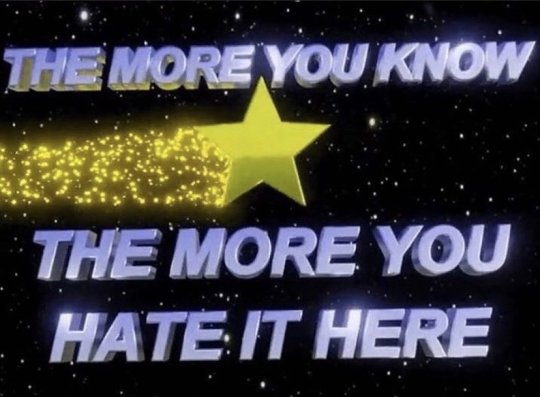
47 notes
·
View notes